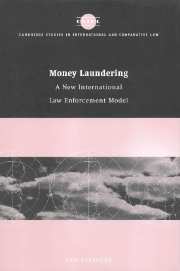Book contents
- Frontmatter
- Contents
- Preface
- Table of treaties and agreements
- List of abbreviations
- Part I New instruments in the fight against acquisitive crime: confiscation of proceeds from crime and criminalisation of money laundering
- Part II The prevention of money laundering
- Part III Jurisdiction over money laundering
- Part IV International co-operation in combating money laundering
- 11 The money laundering regime: new objectives of international co-operation in criminal matters
- 12 The money laundering regime: new modes of international evidence-gathering
- 13 Some of the conditions, principles and exceptions of mutual judicial assistance in criminal matters revisited
- 14 Lifting banking secrecy in an international context
- 15 Provisional measures for preserving alleged proceeds of crime in an international context
- 16 International enforcement of confiscation orders
- Epilogue
- Bibliography
- Index
- CAMBRIDGE STUDIES IN INTERNATIONAL AND COMPARATIVE LAW
14 - Lifting banking secrecy in an international context
Published online by Cambridge University Press: 16 October 2009
- Frontmatter
- Contents
- Preface
- Table of treaties and agreements
- List of abbreviations
- Part I New instruments in the fight against acquisitive crime: confiscation of proceeds from crime and criminalisation of money laundering
- Part II The prevention of money laundering
- Part III Jurisdiction over money laundering
- Part IV International co-operation in combating money laundering
- 11 The money laundering regime: new objectives of international co-operation in criminal matters
- 12 The money laundering regime: new modes of international evidence-gathering
- 13 Some of the conditions, principles and exceptions of mutual judicial assistance in criminal matters revisited
- 14 Lifting banking secrecy in an international context
- 15 Provisional measures for preserving alleged proceeds of crime in an international context
- 16 International enforcement of confiscation orders
- Epilogue
- Bibliography
- Index
- CAMBRIDGE STUDIES IN INTERNATIONAL AND COMPARATIVE LAW
Summary
Law enforcement authorities investigating money laundering offences, or any other type of profitable offence, are often confronted with the type of situation in which, although an offence has in part taken place on their territory, the fruits of the crime have been siphoned away to a secrecy jurisdiction, where information relating to the proceeds is protected by stringent banking secrecy rules. Where financial transactions were part of the criminal scheme, the information thus shielded from the prying eyes of law enforcement authorities will not only relate to the proceeds from the offence, but to the actus reus itself. An international report on offshore jurisdictions – commissioned by the United Nations – correctly points out that offshore financial systems offer not only an excellent conduit for money laundering, but also a ‘tool kit’ for the perpetration of certain types of financial crime. In the efforts of law enforcement authorities to penetrate foreign (banking) secrecy rules, two main strands of international evidence gathering can be recognised. On the one hand, a number of co-operative mechanisms have been created to allow access to information and evidence which is located abroad and shielded by a secrecy duty. Alternatively, and at least as important, certain unilateral measures have been adopted by some, notably American, authorities to obtain this information. It is interesting that the diplomatic tensions that have been created by American measures of this type almost exclusively concern attempts to penetrate foreign banking secrecy rules rather than the obstacles posed by foreign professional secrecy duties of, for example, lawyers. It seems therefore that US authorities have greater respect for foreign professional privileges than for foreign banking secrecy rules.
- Type
- Chapter
- Information
- Money LaunderingA New International Law Enforcement Model, pp. 311 - 351Publisher: Cambridge University PressPrint publication year: 2000

